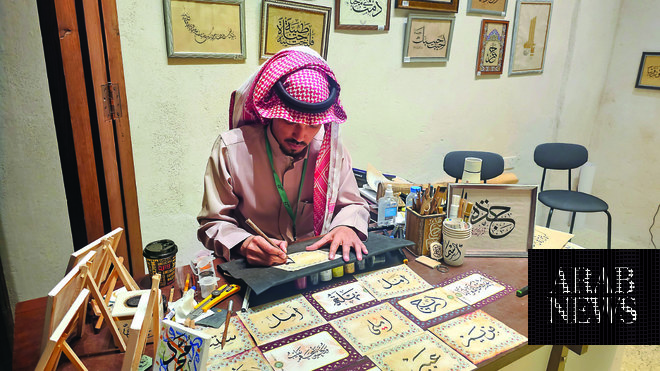Riyadh: French Interior Minister Gerald Darmanin undertook an official visit to Saudi Arabia from Feb. 14 to 16, following an invitation from his Saudi counterpart, Prince Abdulaziz bin Saud bin Naif.
The two ministers addressed matters concerning the enhancement of security cooperation between Saudi Arabia and France.
During his visit to Riyadh, Darmanin met several senior Saudi officials, including Minister of Islamic Affairs Sheikh Abdullatif Al-Asheikh, Muslim World League Secretary-General Dr. Mohammed bin Abdulkarim Al-Issa, and Assistant Minister of Investment and CEO of the Saudi Investment Promotion Authority Ibrahim Al-Mubarak.
On the fringes of this three-day visit, the French minister gave an exclusive interview to Arab News. He said: “I have come to Saudi Arabia accompanied by a large delegation of French companies working in the field of cybersecurity to promote the excellence of our know-how in an area to which our Saudi partner attaches great importance.
“As you know, our two countries have enjoyed exceptional bilateral relations for many years. France stands by Saudi Arabia to support its major projects, whether they involve developing and securing the culture and tourism sectors, in particular in AlUla, or the Expo 2030; contributing to the country’s energy and economic diversification; or supporting the training of Saudis through educational cooperation between our two countries.
“I welcome the momentum that has marked our bilateral relations for more than two years. Exchanges between our governments have multiplied, as have our economic exchanges. I am the 7th minister to visit Saudi Arabia in just over a year.
“The visit comes at a time when, in the past five years, the Kingdom has embarked on an ambitious program of reforms and modernization in all sectors — economic, social and cultural — as part of Vision 2030, under the leadership of Crown Prince Mohammed bin Salman.”
Darmanin added: “Today I had the opportunity to witness these changes, through field visits, interviews and exchanges with the Saudi personalities involved in this process, which is unprecedented not only in the region but also in the history of the country.
“Today, our relations are looking to the future. They are the fruit of a widely shared vision of development, education, culture and environmental protection. They are rich and varied. The Kingdom has become a major player in humanitarian action and development aid.
“We have created economic partnerships and cooperative ventures in every field, including energy, water and the environment, transport and logistics, tourism, leisure and culture, sport, health, agri-food, new technologies, aeronautics and space, as well as financial services and investments. There are many synergies between the France 2030 plan and Vision 2030, both of which are at the service of our young people.”
On the recently held World Defense Show in Riyadh, the minister said that it was the most eagerly awaited event for French defense companies. “It testifies to the Kingdom’s commitment to becoming a global hub for the defense industry and confirms the rapprochement between our two countries in terms of defense.
“The prospects for future cooperation between our two countries in the field of security and defense are significant. We have a long-standing relationship of trust in this sector.”
Security was an important component in the implementation of Vision 2030, Darmanin said. “It involves overseeing major cultural and sporting events, supporting the development of tourism in the Kingdom, planning the security architecture for major projects that are being built, and training the security forces.
“I’m also thinking of the increasing number of women who want to choose security careers in Saudi Arabia, as I was able to see for myself at the King Fahd Security College.”
The minister said that the fight against terrorism and cybercrime was also a priority. “Saudi Arabia’s economy is rapidly going digital. The protection of critical infrastructures and data protection are challenges that our two countries can tackle together.”
The Kingdom sees the development of the tourism and entertainment sectors as a crucial objective in its Vision 2030, as the region gradually reduces its dependence on oil and looks forward to benefiting from French expertise. Saudi Arabia’s national tourism strategy aims to attract more than 150 million visitors by 2030 and increase the tourism sector’s contribution to the country’s gross domestic product to more than 10 percent.
The French minister told Arab News: “In view of its major projects in Saudi Arabia, the French community is active and dynamic in areas of activity that are essential to the life of the country. The majority of French nationals work for major French, Saudi and foreign groups in the energy, defense, transport and tourism sectors.
“Trade between France and Saudi Arabia continues to grow. Some 6,800 French nationals now live in Saudi Arabia, making it the largest EU community in the Kingdom.
“In terms of visitors, there has been a significant increase in travel by our compatriots to Saudi Arabia. Their numbers have risen from 80,000 to more than 150,000 between 2019 and 2023, i.e. more than 91 percent more visitors. These developments illustrate the extent to which the context and attractiveness of Saudi Arabia have changed.”
The French minister said that Saudi Arabia introduced the e-tourist visa in September 2019, opening up significantly to foreign visitors. “It has made it easier to combine religious tourism with other types of visits in 2022. This strategy has been accompanied by an intensive and ongoing communication campaign to highlight societal changes, Saudi heritage and culture. International sporting and cultural events hosted by the Kingdom have also helped to raise its profile.”
The minister added: “As the world’s number one tourist destination, France is ready to support the Kingdom in the developments set out in the crown prince’s Vision 2030, so that the country, which is already a leading destination for religious tourism, can also attract more and more international tourists.”
* This article originally appeared in French on Arab News en Francais. Click here to read it.
